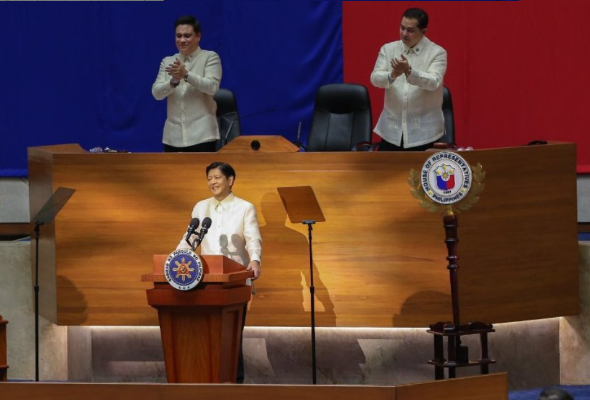
“Our country must become a travel destination,” Marcos said.
Additionally, Marcos promised to simplify the procedure and the transactions and make tax changes. He emphasized the processes being streamlined by the Bureau of Customs. He declared he would support budgetary policies that would maximize the advantages for our economy.

“We will implement sound fiscal management. Tax administration reforms will be in place to increase revenue collection, expenditure priorities will be realigned and spending efficiency improved to address economic scarring from COVID-19 and prepare for future shocks,” Marcos said.
“Our medium-term fiscal strategy aims to attain short-term macrofiscal stability while supporting economic recovery, promoting medium-term fiscal sustainability,” he added.
The macroeconomy has been challenged by the pandemic, which has led to inflation, but according to Marcos, our economic growth is still strong based on our present GDP. Spending priorities will be rearranged to meet the COVID-19-related economic damage, he said.
A strong manufacturing sector, high COVID-19 immunization rates, improved healthcare, and other efforts are among those that will continue to be successful throughout the rest of the year.
There are two issues affecting the food supply, both short-term and long-term. It is important to address the high cost of food and the inadequate availability of food. Beneficiaries will receive loans to encourage the use of improved agricultural inputs. The "value-chain" will be improved to boost agricultural productivity.
“Ipaprayoridad natin ang modernisasyon ng mga sakahan sa pamamagitan ng makabagong teknolohiya para sa ating mga magsasaka,” he continued.
“Magbibigay tayo ng pautang habang mas ilalapit sa sektor ng agrikultura ang hindi gaanong mahal na farm outputs na bibilhin na ng bulto ng gobyerno. Kabilang dito ang mga abono, pestisyido, ayuda, at fuel subsidy,” Marcos added.
Roads from farm to market will be expanded. To assist customers in getting access to inexpensive goods, Kadiwa Centers will be reintroduced.
An executive order on a moratorium will be issued to protect them as agrarian reforms proceed. The moratorium will have the support of civil society because it will safeguard farmers. The moratorium will state that the loans with interest that farmers could not pay under the agrarian reform program will be condoned.
“Ang agrarian reform program ay dapat magpatuloy. Agrarian reform is not only about acquisition but also support services and distribution. I intend to issue an executive order to impose a one-year moratorium for the payment of land amortization and interest payments,” Marcos assured.
Tourism will be prioritized to promote the Filipino brand of hospitality and create more jobs.
“To boost our tourism industry, we’ll make basic developments such as road improvement. We’ll also upgrade our airports, make more international airports to help decongest the bottleneck in the Manila airport,” Marcos said.
Social welfare must be improved in times of crisis and difficult times. Social aid lists such as the 4PS will be “cleaned” to remove those who have already “graduated” and allow more families who need it more to receive financial aid.
“Marcos on calamity response: Magdadagdag tayo ng operation centers, warehouses, imbakan ng relief goods lalo na sa mga lugar na mahirap marating. Titiyaking maayos ang koordinasyon ng DSWD, DHSUD para sa biktima ng kahit anong kalamidad,” he said.
Supplemental feeding of children will be expanded. Solo parents will be given enough benefits, while women who are victims of violence will be protected. The vulnerable and PWD centers will be given attention.
Marcos assured that there would be no more lockdowns. They will help create a balance of economic growth and health, so no one will be put at risk. He said he will learn to get used to the COVID-19 virus as part of our lives so we can go back to our normal lives and “full capacity” for businesses.
“Dapat nating balansehin ng maayos ang kalusugan at kapakanan ng ating mamamayan sa isang bansa at ang ekonomiya sa kabilang banda,” Marcos said.
Marcos said he will build our own Center for Disease Control Prevention and a Vaccine Institute, as well as more hospitals. Public healthcare should be accessible for all. He said he would build more healthcare facilities and specialized hospitals not just in Manila but all over the parts of the country.
Efforts will be made to improve the benefits of healthcare frontliners, doctors, nurses, and others. Access to affordable medicines will also be prioritized and will pave the way for more generic medicines in the market.
“Sinimulan ko na ang pakikipagusap sa mga kompanya ng gamot dito sa Pilipinas at sa ibang bansa. Hinihikayat natin na buksan nila ang merkado upang bumaba ang presyo ng gamot,” he said.
Face-to-face classes will resume with the health of learners and teachers in mind. Booster shots are encouraged. Refresher courses will be offered to teachers to help them keep up with the changes. A review of the K-12 program will also be conducted.
Marcos said the alleged poor quality of education in the country must end. The country must keep up with technological advancements and better telecommunications services.
He said, “Universal connectivity will be a vital component in order to ensure that no citizen is left behind.”
In terms of infrastructure, the outgoing president Rodrigo Duterte's legacy will be carried on. No infrastructure program will be suspended by Marcos, and it will even be extended. The improvement of the infrastructure is crucial to his administration. This will enhance all areas of the nation's economy, including agriculture and even government.
“We must keep the momentum and aspire to build better. I will not suspend any ongoing projects as those have shown to be of benefit to the public that they serve,” Marcos said.
Railways will be modernized to improve public transport all over the country. Roads and transport hubs will be improved in key cities such as Cebu, Davao, Ilocos, El Nido, and many others.
“We missed opportunities to develop the railway system. The railways offer great potential. It continues to be the cheapest way of transporting goods and passengers,” he said.
A top priority will also be finding affordable, dependable electricity. The Marcos administration will construct more power plants so that it may utilize technology, particularly renewable energy sources, and have more energy sources. Solar, wind, and other forms of energy are appropriate for the Philippines. Marcos said that it could be time to consider whether we can employ nuclear power plants. Public-Private Partnerships would make this possible (PPP).
“We must increase the level of energy production. We should look at every possible option. There is some room to expand our power supply — but this is only to a limited extent. We must build new power plants,” he said.
The President would also look into the water supply, especially in urban areas. Furthermore, the preservation of the environment is also of great importance. The Philippines is a disaster-prone country, and efforts against climate change must be supported.
Overseas Filipino Workers (OFWs) will be protected as they work abroad with the creation of One Repatriation Command Center. “Red tape” will be removed by digitizing the contracts of migrant workers. It should only take 3 weeks instead of 3 months for an aspiring OFW to process their employment.
“We shall automate the verification of contracts and issue secure overseas employment certifications that you can keep on your smartphones. I call on the Department of Migrant Workers and the DICT to make this a top priority,” Marcos said.
Families of OFWs will be given benefits and supported by giving them training on financial literacy, business, etc.
In terms of foreign policy, Marcos assured he will not abandon our right to our own power and land. The Philippines will be a friend to all, but we will protect “all that is very Filipino.”
“I will not preside over any process that will abandon even one square inch of territory of the Republic of the Philippines to any foreign power,” Marcos said.
Marcos listed some of his legislative measures, which include:
- The Tax Package 3 Valuation Reform Bill
- Budget Modernization Bill
- Adoption of the proposed Passive Income and Financial Intermediary Taxation Act
- Pass the proposed National Government Rightsizing Program
- Amend Build, Operate, and Transfer Law
- Amend Electric Power Industry Reform Act
- Reinstitute mandatory Reserve Officers' Training Program
- Pass Ecommerce Law
- Unified System of Separation, Retirement & Pension
- Establish Dept of Water Resources
- Virology Institute of the PH
- Nat'l Disease Prevention Management Authority
- Establishment of Medical Reserve Corp under Department of Health (DOH) composed of physicians, medicine students
Marcos concluded by expressing his belief in the resilience of Filipinos due to our unyielding character. "To help us through the current global crisis we are facing, we have gathered the brightest Filipino minds. We'll persevere. I am absolutely certain of this in my head, heart, and soul. The country is in good shape, he said.





















Facebook Conversations